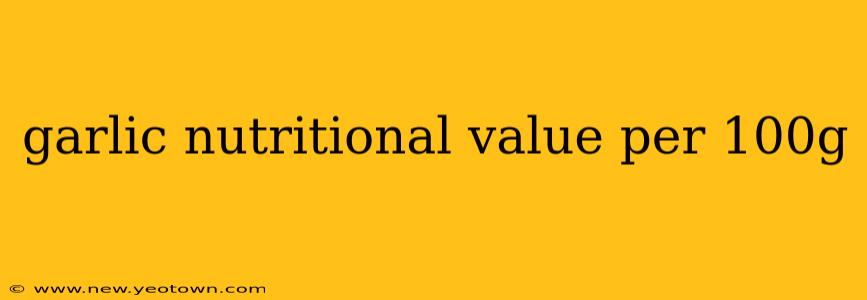The Surprising Nutritional Powerhouse: Unveiling the Nutritional Value of Garlic (per 100g)
Garlic, that pungent bulb often relegated to the role of mere flavor enhancer, is actually a nutritional superstar. Far from being a simple culinary ingredient, garlic boasts a rich profile of vitamins, minerals, and beneficial compounds that have earned it a place in traditional medicine for centuries and now, increasingly, in modern health and wellness discussions. Let's delve into the nutritional value packed into just 100 grams of this remarkable food.
A Closer Look at the Numbers (Approximate values may vary based on cultivar and growing conditions):
While precise nutritional content can fluctuate, a typical 100g serving of raw garlic generally provides the following:
- Calories: Approximately 149 kcal
- Carbohydrates: Around 33g (mostly in the form of simple sugars)
- Protein: Approximately 6.4g
- Fat: Negligible (less than 0.5g)
- Fiber: Roughly 2.1g – contributing to digestive health.
Beyond these macronutrients, garlic’s true nutritional power lies in its impressive micronutrient profile and bioactive compounds.
What Vitamins and Minerals are in Garlic?
Garlic is a good source of several essential vitamins and minerals, including:
- Vitamin C: A powerful antioxidant crucial for immune function.
- Vitamin B6: Important for brain development and function, and red blood cell formation.
- Manganese: A vital mineral involved in bone health, wound healing, and metabolism.
- Selenium: A potent antioxidant that plays a key role in thyroid function and protecting against cell damage.
- Potassium: Essential for maintaining healthy blood pressure.
What are the Health Benefits of Garlic?
The health benefits of garlic are extensively documented, and largely attributed to its high concentration of allicin. This sulfur-containing compound is formed when garlic is crushed or chopped, releasing its potent bioactive properties. Allicin is responsible for many of garlic's beneficial effects, including:
- Immune System Support: Garlic's high vitamin C and allicin content work synergistically to boost the immune system and fight off infections.
- Antioxidant Properties: Garlic's antioxidants combat oxidative stress, protecting cells from damage and reducing the risk of chronic diseases.
- Blood Pressure Regulation: Studies suggest garlic may help lower blood pressure, reducing the risk of heart disease.
- Cholesterol Management: Some research indicates that garlic can help lower LDL ("bad") cholesterol levels.
- Anti-inflammatory Effects: Allicin and other compounds in garlic possess anti-inflammatory properties, potentially beneficial for conditions like arthritis.
Is Garlic Good for Weight Loss?
Garlic itself isn't a magic weight-loss bullet, but it can contribute to a healthy weight management strategy. Its low-calorie, high-fiber content can help you feel full, reducing overall calorie intake. Furthermore, some studies suggest garlic may influence metabolism and fat burning, although more research is needed in this area.
Are There Any Side Effects of Eating Too Much Garlic?
While generally safe, consuming excessive amounts of garlic can lead to side effects like:
- Bad Breath: This is the most common and easily remedied side effect.
- Heartburn: Garlic can trigger heartburn in some individuals.
- Body Odor: Garlic's strong odor can be absorbed into the bloodstream and affect body odor.
- Allergic Reactions: Though rare, allergic reactions to garlic are possible.
In Conclusion:
Garlic is far more than just a culinary spice; it's a nutritional powerhouse packed with vitamins, minerals, and bioactive compounds that offer a range of potential health benefits. By incorporating garlic regularly into your diet, you can harness its nutritional power and contribute to your overall well-being. Remember, moderation is key to enjoying garlic's benefits without experiencing any negative side effects.

